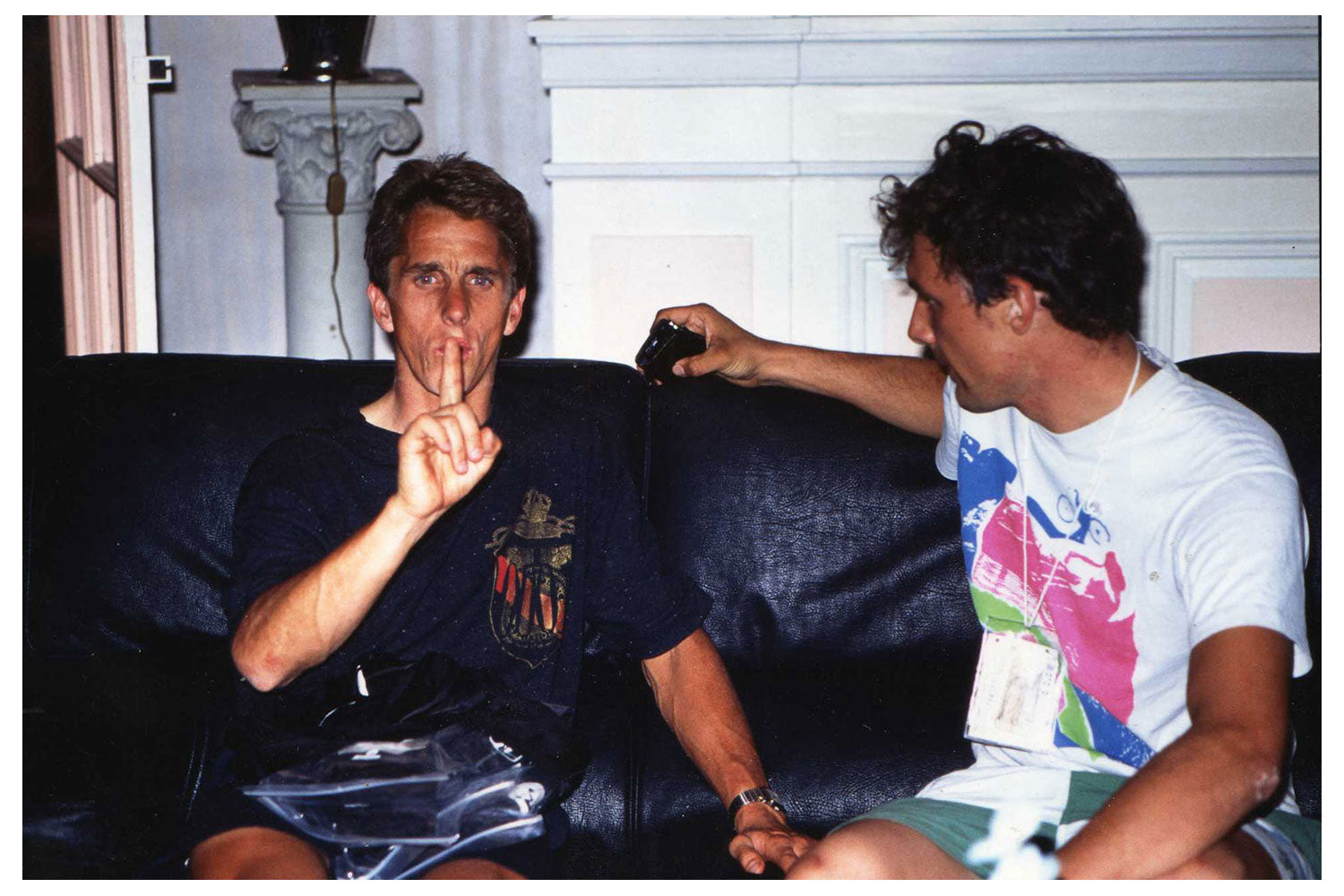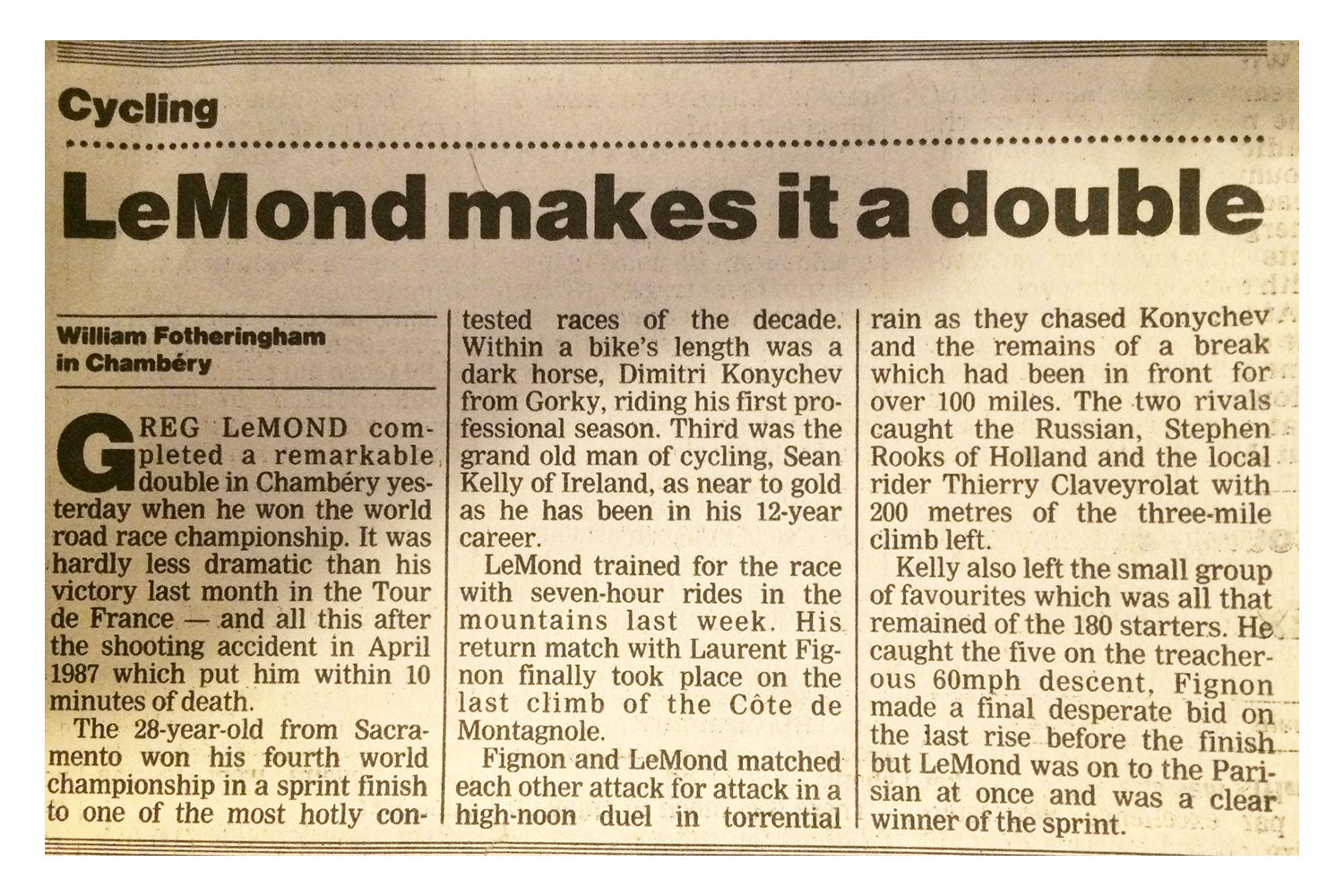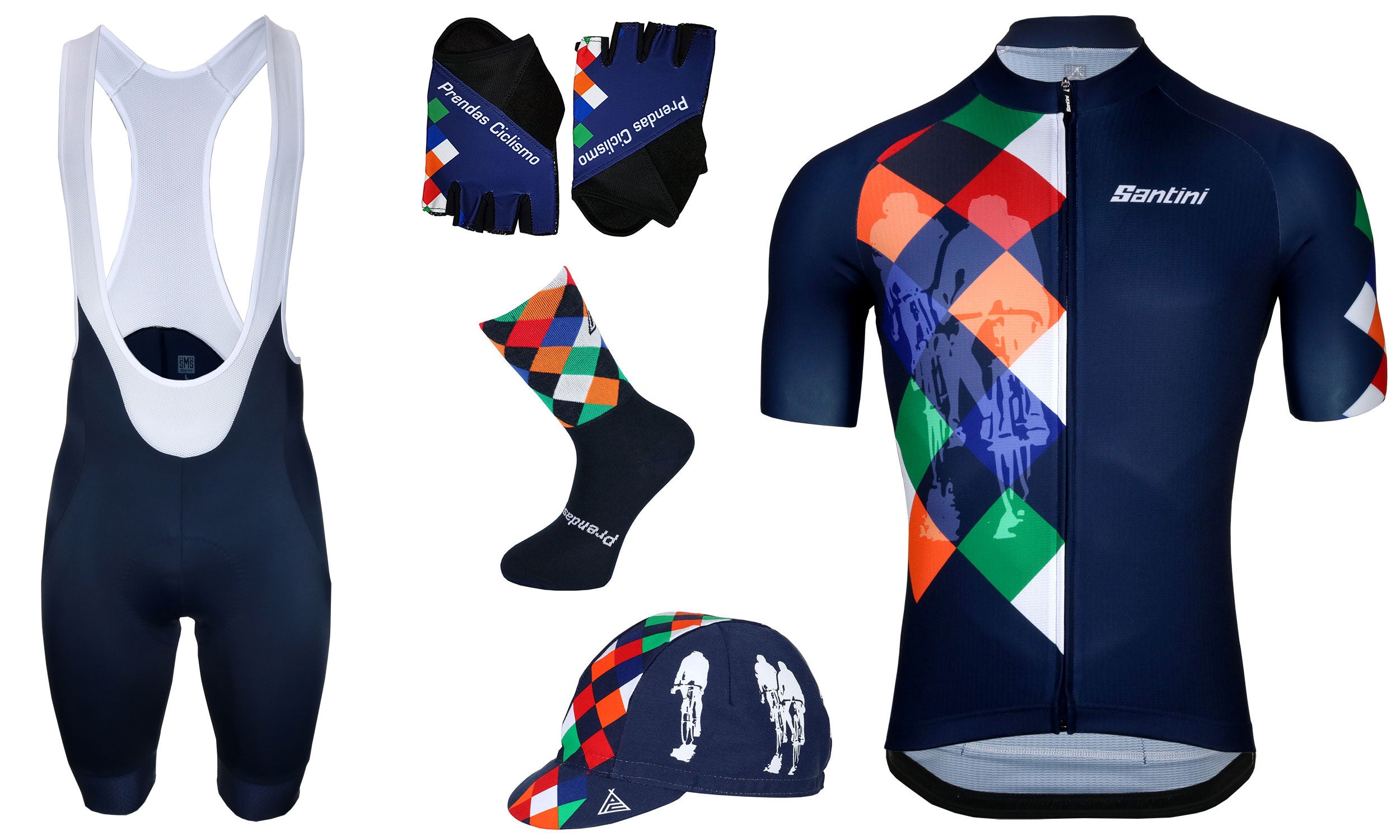QUALITY CYCLING CLOTHING SINCE 1996 - THE UK'S FIRST RETRO MANUFACTURER
QUALITY CYCLING CLOTHING SINCE 1996 - THE UK'S FIRST RETRO MANUFACTURER
RETRO APPAREL
COLLECTIONS
Cycling Clothing
ACCESSORIES
Road World Championships - Chambéry 1989
August 28, 2019 5 min read

See the incredible delight captured by A. Landrain in Greg Lemond's face having sprinted to victory at the 1989 UCI Road World Championships in Chambéry, France. Photo Credit: Press Sports / L'Equipe.
Cycling author & journalist William Fotheringham recalls his memories of the 1989 road world championships held in Chambéry, France where Greg Lemond (USA) won the rain-soaked sprint for the line.
If you want an argument for running the world road race championships a few weeks after the Tour de France, you don’t have to look much further than 30 years ago, when the circus descended upon the little French town of Chambéry.
The greatest Tour of the post-war era, the ding-dong battle between Greg LeMond and Laurent Fignon, was fresh in everyone’s minds and the super-hard course over the steep Côte de la Montagnole was perfectly suited for the riders who had dominated the Tour.
Back in those days, when I was 24 years old, fresh out of university and totally new to journalism, covering bike races was a huge adventure, and this one was the brainchild of a photographer friend Mark Wohlwender, who sadly died in August 2017, at the age of 50. We drove down from London to Aix-les-Bains, an interminable schlep on the autoroute. When I was at the wheel of his Golf GTI, Mark made calls using a novel piece of technology which no one else I knew possessed: a Motorola mobile phone which was the size and weight of a brick.
We rolled into Aix 36 hours before the pros raced, found a dirt cheap and probably fairly nasty hotel, and on a whim decided to rock up at the US team hotel to see if we could locate LeMond. Like the good freelance he was, Mark wanted a picture of the rider of the moment; like the debutant journalist I was, I wasn’t going to suggest this wasn’t a good idea although I didn’t see why Greg would want to talk to us.
Unbelievably, when we turned up LeMond was in the lobby just saying farewell to another hack (who had probably been there a fair while given the double Tour winner’s legendary inability to stick to a schedule); famously, Greg rarely said ‘no’ to an interview.
This was, of course, before teams hired press officers to get in the way, and before riders had agents who wanted control of their “product”. I still have the picture Mark took of Greg telling him to “hush” while I held my tape recorder under his nose. I apologise for the tee-shirt.

William Fotheringham interviewing Greg LeMond the night before Greg won the world’s in 1989. Photo: Mark Wohlwender.
Back then, there were only three road races on the agenda. Women and amateurs on the Saturday morning and afternoon, professionals on Sunday, making for a nice compact weekend. The women’s race was dominated by Jeannie Longo, pretty much as expected; the amateurs, more surprisingly, by the Pole Joachim Halupczok, who was to die less than five years later of suspected cardiac issues.
The Brits, as so often in those days, were nowhere. (Ed: Aside from the gold medal won by Colin Sturgess in the 5km professional pursuit over Australia's Dean Woods.)
The Sunday was billed as the revenge match between LeMond and Fignon, but many suspected that PDM's Sean Kelly would be the eventual winner, as the Irishman was coming hot-foot from taking his fifth green jersey in the Tour.
Kelly wasn’t as fast as in his younger days, but had often been there or thereabouts at the World’s, where he usually suffered from a lack of team support; on the Côte de la Montagnole, although things might get tactical, it was more than likely that the group would be small enough for him to win the finish sprint.
As the day progressed, a Kelly gold medal looked increasingly on the cards.
Midway through, I went up the Montagnole in a press bus. It was brutally steep as we all knew; not long after I began standing on the roadside watching Thierry Claveyrolat and Dimitri Konychev lead the early breakthrough, the rain began to fall. By the time I got back in the bus to go to the press room to watch the finale, there was water coming down the gutters in torrents, and the fans were sodden.
The race, however, was coming alive. On the final lap the favourites emerged, spurred on by Fignon, who made what looked like the decisive move only to turn and find, to his despair, that LeMond was on his heels – as he had been for so much of that July. Somehow, “Clavet” and Konychev survived, somehow Kelly made it across to the leaders, somehow no one fell off on the final hairpins on the tarmac that must have been like glass.
The sprint? It had to be Kelly... except that Kelly had chosen a lower gear than LeMond, and the American was surprisingly fast in a small group sprint after a seriously hilly race. He had won a stage of the Tour at Aix-les-Bains in similar circumstances. The final move was made by Fignon; the final thrust by LeMond as Kelly despaired.
My rear wheel was rubbing on my brakes for the last lap. When it broke, with three laps to go, I thought about stopping for a new one. Had I done that, I would have been dropped for sure.
I was riding for the gold medal. I wanted that World Championship. And with one kilometre to go, I knew I could get it.
Greg LeMond. October 1989, Winning Magazine
Not long afterwards, I watched the Irishman pedal across the puddles in a parking lot next to the press room as he came to explain what had happened. His body language was that of a man who knew he had just blown the chance of a lifetime.
I knew I had lost it before the line. I more or less stopped sprinting with 10 or 15 metres to go.
Sean Kelly. October 1989, Winning Magazine
For me, this was a landmark day, my first opportunity to write about a race live for The Guardian; a hurried 300 words filed down a phone line. That led on to other work; 30 years later I should be there to report on another World’s, this time on home soil in Yorkshire.
At the time, that would have seemed just as unexpected as a LeMond win did on that sodden day in the Alps.
Results: 1989 Professional Road Race Cycling Championships
1 Greg Lemond (United States of America) 6:45:59
2 Dimitri Konyshev (USSR) s.t.
3 Sean Kelly (Ireland) s.t.
4 Steven Rooks (Netherlands) s.t.
5 Thierry Claveyrolat (France) at 0:03
6 Laurent Fignon (France) s.t.
7 Martin Earley (Ireland) at 0:10
8 Gianni Bugno (Italy) s.t.
9 Rolf Sørensen (Denmark) s.t.
10 Claude Criquielion (Belgium) s.t.
Full results available on procyclingstats.com


You can buy the exclusive Chambéry 1989 collection at Prendas Ciclismo.
Also in News and articles from Prendas Ciclismo

Prendas' Best-Selling Caps of 2024
January 21, 2025 4 min read
With 2024 in the books, we're looking back at your favourite caps of the year. From cult classic movies to the jungle with a whole lot of Italian flair, check out our best-sellers and grab a new cap!

Vas-y Barry! Hoban wins Ghent-Wevelgem for Gan Mercier Hutchinson
May 15, 2024 8 min read
In an extract from his autobiography, Vas-y Barry, the only British winner of Ghent-Wevelgem, Barry Hoban tells how he won the cobbled classic in 1974, beating Eddy Merckx and the cream of Belgian cycling.

Our Best Selling Caps of 2023
January 15, 2024 4 min read
We know caps here at Prendas Ciclismo, and we know that you love all the styles we have on offer. So every year, we look back at our best-selling cycling caps for the previous year for you to discover a few new styles. Is your favourite cycling cap featured on our list? Read on and see!
Subscribe
Sign up to get the latest on sales, new releases and more …

